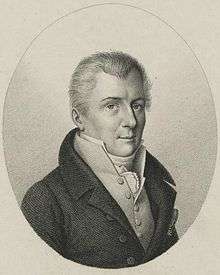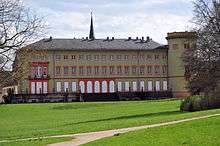Emmerich Joseph de Dalberg
| Emmerich Joseph de Dalberg | |
|---|---|
 1815 portrait | |
| Born |
31 May 1773 Mainz, Electorate of Mainz |
| Died |
27 April 1833 (aged 59) Schloss Herrnsheim near Worms, Germany |
| Nationality | German, French |
| Occupation | Diplomat, politician |
Emmerich Joseph Wolfgang Heribert de Dalberg (31 May 1773 – 27 April 1833) was a German diplomat who acquired French citizenship in the Napoleonic era, and held senior government positions during the Bourbon Restoration.
Early career
Emmerich Joseph Wolfgang Heribert von Dalberg was born in Mainz, then capital of the Electorate of Mainz, on 31 May 1773. He was the nephew of Karl Theodor Anton Maria von Dalberg, arch-chancellor of the Holy Roman Empire, Prince primate of the Confederation of the Rhine and Grand-Duke of Frankfurt. His family meant him to pursue a career in the church. He studied at the University of Göttingen in Lower Saxony.[1]
Von Dalberg was at Vienna in the Imperial Chancellery when the stance of his uncle, who had taken the French side, ended his diplomatic career with the Austrian court. He was named Councillor to the King of Bavaria. After the Treaty of Lunéville (9 February 1801) between the French Republic and Francis II, Holy Roman Emperor, he was accredited to Paris as minister of the Margrave of Baden. He negotiated the marriage of the young Charles, Grand Duke of Baden, with Princess Stéphanie de Beauharnais, niece of the Empress Josephine. Talleyrand befriended him and arranged for him to marry Mlle. de Brignoles, one of the ladies of the Empress.[1]
After the Treaty of Vienna in 1809 von Dalberg was naturalized as a French citizen, and charged with negotiating Napoleon's marriage with Marie Louise of Austria. On 4 August 1810 he was created a duke of the Empire. He was made a Councilor of State on 14 October 1810, with a large endowment. When Talleyrand was disgraced, he also fell from favor.[1]
Bourbon Restoration

After Napoleon was defeated, de Dalberg and Talleyrand both joined the French provisional government of 1814, and both assisted at the Congress of Vienna. On 22 July 1814 King Louis XVIII of France gave de Dahlberg the Grand Cordon of the Legion of Honour. He left France during the Hundred Days when Napoleon returned from exile, and returned after the second Bourbon Restoration. On 17 August 1815 he was made a Peer of France and Minister of State. On 26 January 1816 he was appointed ambassador to Turin. In the chamber of peers he showed himself in favor of the Charter of 1814.[1] Towards the end of the Restoration he retired to his castle of Herrnsheim, where he died on 27 April 1833.[2]
Works
- Remarques sur les émigrés et leurs droits à l'occasion de leur bannissement de nos provinces
- Documents historiques sur la mort du duc d'Enghien
- Considérations sur le projet d'une alliance entre l'Autriche et la Suisse (unpublished)
- Mémoire sur le Palatinat (unpubished)
References
Citations
- 1 2 3 4 Robert & Cougny 1891, p. 242.
- ↑ Robert & Cougny 1891, p. 242-243.
Sources
- Robert, Adolphe; Cougny, Gaston (1891). "DAHLBERG, Emerich-Joseph-Wolfgang-Heribert, duc de". Dictionnaires des Parlementaires français de 1789 à 1889 (PDF). II, de CAY à FES. Retrieved 2014-05-01.
| ||||||||||||||||||||||||||||||||||||||||||||||||||
| ||||||||||||||||||||||||||||||||||||||||||
|